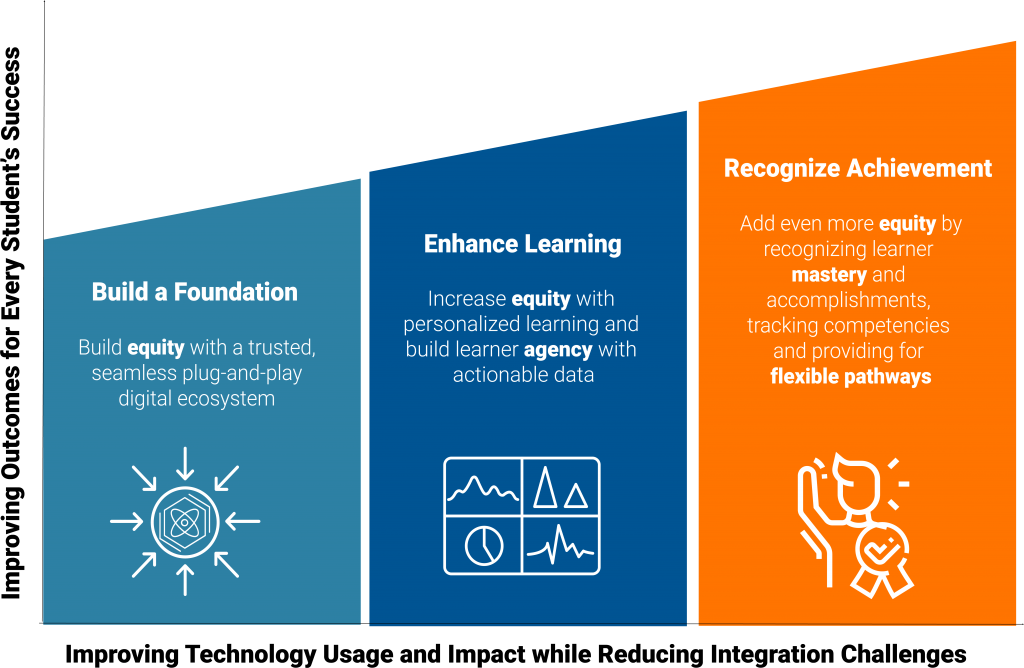Prior to 2020, educational tool interoperability might have been a nice-to-have; however, with most schools having a large portion of their curriculum online for Fall 2020, it is now critical. From proprietary/custom integration solutions to standards adoptions, there are many options to choose from for interoperability. Unicon is a big proponent of standards-based integrations and has been active in the IMS Global Learning Consortium® (IMS) community for years. We have representation in committee meetings, serve as IMS committee chairs, and are often called upon to assist with new initiatives. If you ever wanted to know what IMS standard you should be considering and when to use it as part of the digital evolution adoption, this article is MEANT FOR YOU!
The digital transformation of the education ecosystem will grow substantially over the next several years. As institutions, faculty, students, and families adjust to the online, digital-first structure of the 2020/2021 school year, everyone is wondering which of these changes are permanent. As the pandemic ends (and I keep telling myself it will), will in-person learning return to the forefront or are learner-centric digital experiences going to gain momentum with more institutions and learners? What other demands will the online learner have moving forward?
For our clients, we work closely with them to understand the IMS standards available and help them adopt and integrate the standards that align with their digital ecosystem goals. I really like the outcomes focused way IMS has organized their initiatives on their website. Brilliant! This categorization is a great way to break down the list of IMS standards into an easily digestible format for companies and institutions trying to understand how best to plan their work and overall adoption strategy based on their digital learning ecosystem goals.
IMS has categorized its standards to align with three distinct phases that an institution might be in for its digital ecosystem integration strategy. These phases include Build a Foundation, Enhance Learning, and Recognize Achievement for K-12 and Higher Ed. Unicon has helped our clients implement solutions that align with each of these phases.
Digital Transformation Using IMS Standards

Image Courtesy of IMS Global Learning Consortium
Build a Foundation
If you are an edtech vendor and you have a new nifty tool, the first thing you probably want to do is figure out how your users can get access to it. And since most schools today use some sort of online learning platform, your tool needs to work with them. That's where these standards come in. LTI & OneRoster are used to allow an authorized set of users move from a learning platform to a tool, typically based on the class roster. The integration standards outlined below are designed to allow you to build a foundation of interoperability.
- Learning Tool Interoperability® (LTI® 1.3) - This IMS standard continues to be the one most requested by our customers. Unicon works to ensure that LTI aligns with your current authentication and authorization mechanisms. We are seeing demands from both K-12 and Higher Ed institutions driving the adoption of this standard with our EdTech and publisher partners. LTI 1.3 leverages the IMS Security Framework for its additional data privacy and security features as well as other enhancements. The LTI 1.0 and 1.1 standards will be deprecated in December 2021.
- OneRoster® - After the initial single sign-on (SSO) authentication is completed with LTI, Unicon often works closely with our partners on the adoption of OneRoster. This supports the seamless transmission of class and student roster data from one application to another. No more duplication of effort for teachers. Assignments are also supported. While the OneRoster specification focuses primarily on serving the K-12 market, Edu-API is an emerging standard focused on the Higher Education space that connects enterprise student information system (SIS) data with your educational tooling. Unicon is seeing greater adoption of both of these standards as the race to digital continues to grow. OneRoster version 1.2 is currently under development and boasts increased security, flexible demographic data, and the ability to bring assessment results data into your SIS application.
- TrustEd Apps & Data Privacy - This is a relatively new standard gaining significant momentum in the IMS community. The IMS Data Privacy standard is a defined rubric specified by IMS to ensure a learning application passes stringent security and privacy requirements. K-12 and Higher Education institutions can feel confident that the applications certified through the IMS TrustEd Apps vetting process have successfully passed the security and privacy analysis set forth by the community. The Unicon team is versed in this privacy rubric and can help ensure that your application meets the minimum standards to be certified by IMS.
- Common Cartridge® and Thin Common Cartridge® - The notion of a common cartridge has been around for decades. It is a standard for packaging content that allows it to be seamlessly imported into different learning platforms. Unicon has helped numerous clients adapt their content to adhere to this standard.
Enhance Learning
Now you have users moving from the platform into your product. What can you do to give them the best possible experience? There are several IMS standards that can take your basic access to the next level. Now that your integration foundation has been built, you are ready to move on to enhancing the teaching and learning aspects of your digital learning ecosystem. Several IMS standards fall into this category.
- LTI Advantage - You will often hear LTI 1.3 and LTI Advantage as part of the same sentence. Each serves a different function. LTI 1.3 is the release update of LTI 1.1 core standard and brings some distinct enhancements around security. LTI Advantage is a set of high-value services often mentioned together with LTI 1.3 since the LTI 1.3 implementation/upgrade is a prerequisite for LTI Advantage certification. LTI Advantage provides for deeper integration with course content and creates an easy path for teachers to add content and links through their native LMS. In addition, LTI Advantage includes near real-time grade updates. We are seeing wider adoption of LTI Advantage to take advantage of the deep content linking and grade passback that it supports.
- OneRoster Gradebook - OneRoster Gradebook is an extension of the OneRoster certification outlined in the foundational standards. The OneRoster specification also includes sending grades from your target education application or LMS to the SIS gradebook. This type of seamless integration is critical for teacher adoption and better parental support and transparency.
- LTI Proctoring Services - With Fall 2020 primarily starting with online learning for much of the world, secure assessments and delivery are important. LTI proctoring builds on LTI 1.3 and is compatible with various learning management and assessment platforms to ensure the security and integrity of each assessment. This service is gaining momentum in the LTI community and is in the early phases of rollout.
- LTI Resource Search - This is an interesting IMS standard gaining momentum that can be linked to specific Learning Objective Repositories (LOR). LTI Resource Search can be integrated with your institution’s learning management system to provide seamless searching of related learning materials for both teachers and students.
- Caliper Analytics® - Unicon uses standards like Caliper Analytics, along with xAPI, for most of our data and analytics client needs. This common standard provides our clients with a standard protocol to retrieve data from supported learning applications to feed a common data lake for normalization and aggregation.
- Question and Test Interoperability® (QTI®) - QTI standards have been around for a long time. These standards are critical for success in porting tests from one application to another. Unicon has worked with many of our client partners to adopt QTI and ensure maximum access to and the availability of their testing suite to all available learning platforms and mediums.
Recognize Achievement
After the foundation has been set and you are well into the enhanced learning phase, now is the time to start thinking about how your users can reap the rewards around the learning experiences you are providing to them. Recognizing achievement is the last phase for integration and interoperability and definitely one to strive for. This phase provides the tools needed for the learner to recognize their accomplishments and demonstrate mastery for key concepts/skills.
- Open Badges 2.0 - Allows learners to share their mastery and accomplishments via social media and provide evidence-based verification of their achievements. The latest version, Open Badges 2.1 (Badge Connect API) enables the transmission of digital badges between platforms and systems to streamline the experience of earning and using Open Badges.
- Comprehensive Learner Record (CLR) - CLR supports a variety of different academic programs in any domain where it’s critical to track and record learner achievements in a digital form. CLR puts the controls in the hands of the learner to collect and curate their data to provide a verifiable and secure learner record to be shared.
- Competencies and Standards Exchange® (CASE®) - Unicon is getting more client requests for assistance with the implementation of the CASE standard for their digital content strategy. Where CASE is extremely beneficial is in the alignment of content and assessments to state standards. Having universal identifiers designed for competencies provides an easy way to share information between educational tools and systems.
Phew! That’s a lot of standards to digest! The intention of this article is to expand your understanding of the IMS standards and provide insights into which standard you should consider based on where you are in the evolution of your learning digital strategy. If you haven’t considered how you are providing a connected and integrated platform for your learners OR you have no idea where to start, consider reaching out to IMS or Unicon. We both work closely with institutions and companies to help them design and implement a learner-centric digital ecosystem that supports their goals and objectives.
